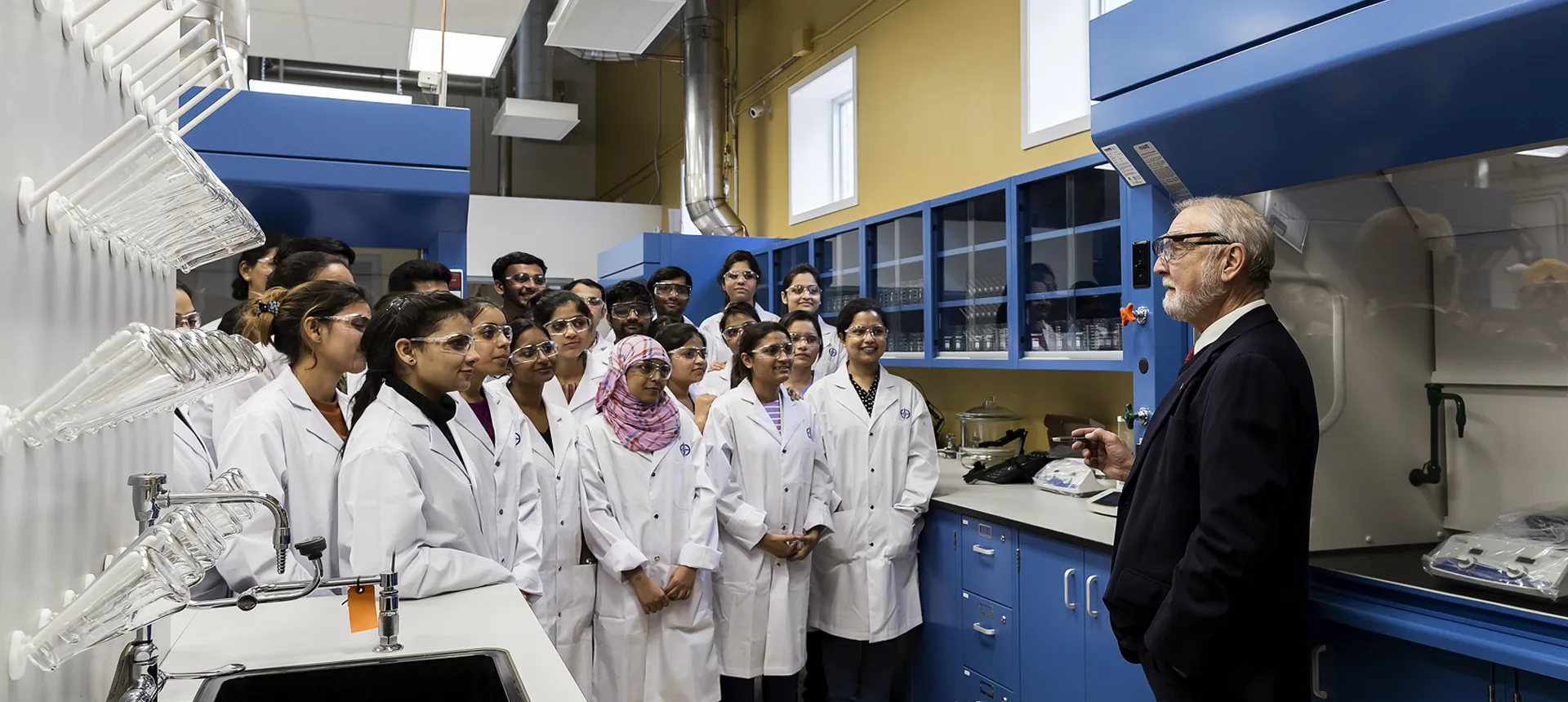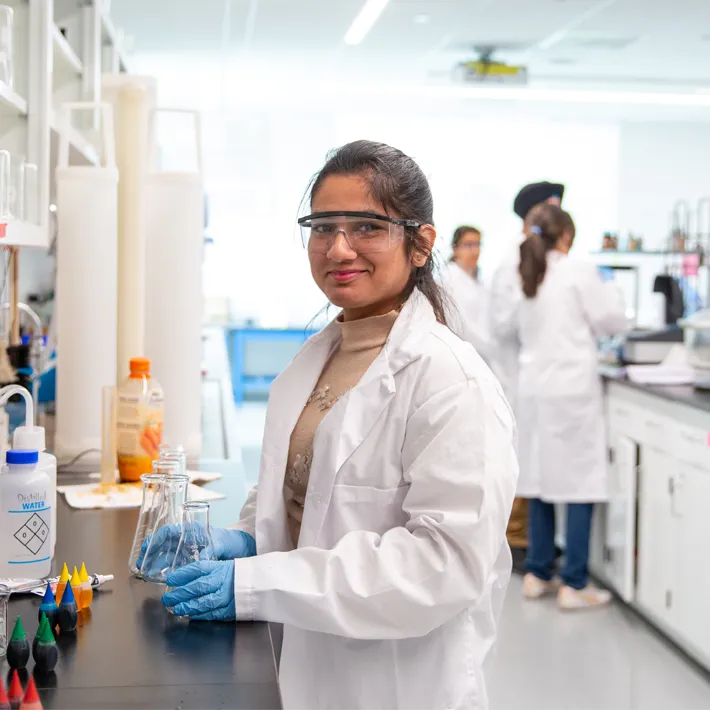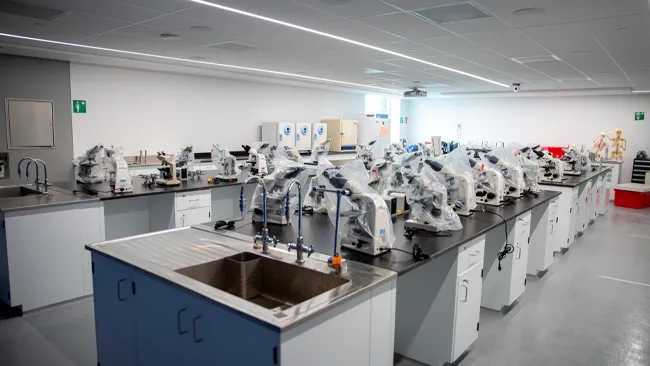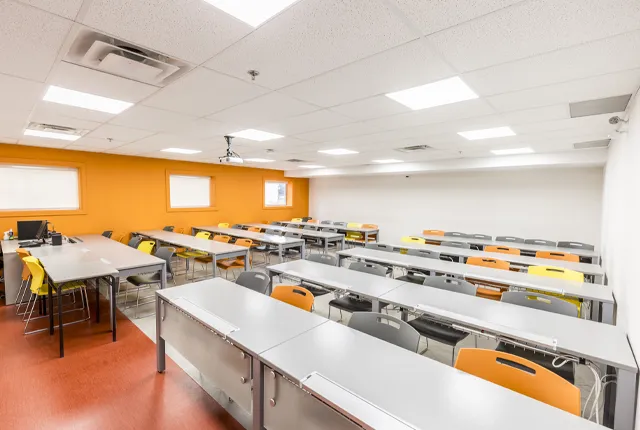

Chemical Laboratory Analysis
Overview
A chemical lab analyst performs various experiments, tests, and analyses on chemical compounds and products to ensure their quality, safety, and compliance with industry and government regulations.
This Ontario College Graduate Certificate program focuses on chemical and environment laboratory analysis and provides career opportunities in laboratory-related occupations in a multitude of different industries and sectors.
The program curriculum combines elements from industrial analytical chemistry and environmental testing while at the same time equipping students with the skills to design, implement, maintain and improve a quality management industrial laboratory. Courses will place emphasis on a combination of technical and management skills in quality control and assurance, data analysis, and instrumentation control and usage.
Students with existing university undergraduate education in chemistry, biology, environmental engineering or pharmacy have the opportunity to utilize their previous theoretical learning to an applied, practical industrial laboratory and research-related setting following national and international standards.
Toronto - A Great Place to Study
Hear from our staff and students about why our Toronto campus gives you a great, well-rounded education in a bustling city centre.
Achieve your goals while immersing yourself in Canadian culture.
Admission Requirements
- A university degree in science, pharmacy, or engineering with appropriate preparation in Math and Chemistry
The admissions process is competitive and meeting the minimum academic requirements does not guarantee admission.
Lambton College reserves the right to alter information including admission requirements and to cancel a program or course at any time; to change the program curriculum as necessary to meet current competencies or changes in the job market; to change the pathways to third-party certification bodies; or to withdraw an offer of admission both prior to and after its acceptance by an applicant or student because of insufficient applications or registrations or over-acceptance of offers of admission. In the event Lambton College exercises such a right, Lambton College's sole liability will be the return of monies paid by the applicant or student to Lambton College.English Language Requirements
Applicants must submit proof of English proficiency through one of the following in-person test methods:
- IELTS Academic: Overall score of 6.0
- TOEFL IBT: Overall score of 70
- PTE Academic: Overall score of 53
- CAEL: Overall score of 60
- CELPIP: CLB 7
- Lambton Institute of English Placement Test: Overall score of 70
- Completion of an English pathway program at a recognized partner school
Meeting the minimum English requirements does not guarantee admission. Students with higher English proficiency scores will receive priority in the admission assessment process. Not all students will qualify for EAP-3106 in place of the required IELTS or TOEFL test scores.
Hear from a Graduate
"Lambton College doesn't only teach you about your program, but helps you to learn more about work ethics which is so helpful for everybody for a bright and successful career.
Studying in Toronto boosted my confidence because of the experienced staff and latest technology."

Costs
- Term 1 $9,180.00
- Term 2 $8,200.00
- Term 3 $8,900.00
- Term 4 $3,490.00
Total Cost of Program
Tuition fees are estimates and are subject to change each academic year. Fees do not include books (unless specifically noted), supplies or living costs.
Lambton College reserves the right to alter information including admission requirements and to cancel at any time a program or course; to change the location and/or term in which a program or course is offered; to change the program curriculum as necessary to meet current competencies or changes in the job market; to change the pathways third-party certification bodies; or to withdraw an offer of admission both prior to and after its acceptance by an applicant or student because of insufficient applications or registrations or over-acceptance of offers of admission. In the event Lambton College exercises such a right, Lambton College’s sole liability will be the return of monies paid by the applicant or student to Lambton College.
Additional Fees
-
Field Trip$200.00Approximate Cost
Textbooks
The anticipated cost for textbooks in this program is approximately $500 - $700 per term. This amount accounts for both mandatory textbook costs (included in tuition fees) as well as textbook fees not included in your tuition fee amount.
Important Dates, Deadline & Late Fees
For additional information on registration dates, deadlines and late fees please refer to Registration Dates and Deadlines.
Student Fees
A student services fee is included in your tuition.
Health Insurance Coverage
Emergency medical insurance is mandatory for all international students at Lambton College. This includes students who are full-time and part-time and who are on a co-op. This insurance is provided by GuardMe - a third party insurance provider.
See Insurance Costs & Details
Technology Requirements
In order to keep pace with the requirements of each and every course in your program, Lambton College requires that each student have access to a laptop while studying at our college.
Labs & Equipment
Courses
Applied Chemistry
This course serves as an introduction to the fundamental analytical techniques required for performance in chemical laboratory-related work. Students learn the basics of performing quantitative analysis on samples based on classical volumetric techniques and modern instrumental methods. The course covers the theory and methodology for the tests that will be done in the associated laboratory course. Students evaluate the process of chemical measurement from sampling through analysis to the interpretation of results. Students learn about the use of the significance of numerical values, choosing an appropriate method of analysis, and basic principles of quality laboratory practice. Evaluations of important areas such as water quality, pharmaceuticals, and food & drink. A variety of techniques are introduced, including volumetric analysis, potentiometry and spectrophotometry.
Normative Standards I
Students are introduced to the Normative Standards which are the internationally accepted documents that describe the current state of the art and science on how to manage and operate a modern analytical testing laboratory. The purpose of this course is to introduce and study these normative documents and Standard Operating Procedures for the purposes of managing their laboratory in the LCACL course.
Laboratory I
Analytical chemistry involves detection, identification and quantitation of the chemical composition of unknown samples. This is the first in a series of laboratory courses designed to introduce students to the science of chemical analysis based on classical analytical chemistry and modern instrumental methods including analysis of metals, electrochemistry, spectroscopy, chromatography and mass spectrometry. In this hands-on laboratory course, students learn how to perform analytical procedures including volumetric analysis, gravimetric analysis, potentiometry, wet chemistry and UV-visible spectrophotometry. Students perform several commonly used analytical tests on a variety of samples. Several different experiments will be performed simultaneously each session to allow lab experiments to be performed.
Laboratory Mathematics I
Laboratory Mathematics is an introductory course in chemistry emphasizing elementary principles and applications of mathematics intended for students in chemical science. Accredited laboratories use many mathematical and statistical methods to manage the laboratory. This course discusses the mathematics used during routine operations of the testing laboratory. The two concepts necessary to communicate are that students make technical evaluations on various projects and discuss management decisions they would make based on the technical evaluations. Topics include the importance of quality control, concepts of completeness, comparability and representativeness, random/systematic errors, data analysis, calculation of standard deviations and how they impact laboratory data quality, outliers, method detection limits and control limits, uncertainty and carry out uncertainty calculations for volume calibrations and calibration standards, linearity/non-linearity of a calibration curve.
Job Search & Success
This course provides student with skills and knowledge to help support their career search and succeed in the workplace. Students align their personal skill set and goals to guide them on their career paths. They will learn how to effectively conduct a job search, build a professional and well-tailored resume and cover letter, and develop and practice interview techniques. Students will also develop their personal brand to help support effective career networking and aid in their job search. Teamwork and collaboration in the workplace are also discussed. Self-reflection is used to inspire insight and support their professional career journey.
Analytical Chemistry II
This serves as an introduction to many analytical techniques that are useful in chemical analysis related work. Students cover such topics as solvent extraction, the flame photometer, atomic emission spectrometer, fourier transform infrared and near-infrared, differential scanning calorimetry and thermogravimetric analysis and interlaboratory events. The course covers the theory and methodology for the techniques addressed in the associated laboratory course.
Normative Standards II
Building on Normative Standards I, this course explores new items in the language of analytical chemistry in the VIM3. Students use documents for laboratory audits, assessments and management reviews of the laboratory quality system in small groups, discussing and formulating their own documents and Standard Operating Procedures for the purposes of managing a quality industrial laboratory. Students attend a local laboratory to discuss current practices with industry professionals.
Laboratory II
Whether performing tests on our air, water, soils or consumer products, analytical chemistry affects our lives in many ways not the least of which is the monitoring of wastewater treatment plants to ensure that the public health is protected, and that wastewater is not released untreated. In this laboratory course students will review important requirements and key exemptions for Transportation of Dangerous Goods (TDG) in Canada. They will obtain hands-on experience performing qualitative and quantitative chemical analysis, compare chemical extraction techniques, learn about the principles of chromatography via paper and thin layer chromatography, as well as calibrate and test samples using an atomic emission spectrometer and UV-Vis. Students perform several commonly used analytical tests on a variety of samples.
Laboratory Mathematics II
Chemistry uses its own "terms" and ways of expressing problem-solving. Some of the mathematical features of chemistry include exponents, scientific notation, orders of operation, algebra, unit conversion, and dimensional analysis, which have many applications for analysing the obtained data in the laboratory. This course introduces students to the mathematics used during analytical method development, validation and troubleshooting operations of the testing laboratory. Topics in this course include the application of statistical software in solving laboratory problems, assessing the standard addition method and its uncertainty, assessing the internal standard method and its uncertainty, recovery correction, Z Score plots, Youden Sample Plot, assessing the means, assessing the systematic error using the confidence interval for the mean, paired t-test, an F Test.
Analytical Chemistry III
This course serves as an evaluation of the utility of various common laboratory instruments and analyzers such as various types of chromatographs and mass spectrometers. The course covers the theory and methodology for the tests done in the associated laboratory course.
Normative Standards III
Students explore information available from various international laboratory accreditation bodies and mutual recognition agreements based on ISO/IEC Standard 17025. The ISO 9001 Quality System and the Organization for Economic Co-operation and Development (OEDC) systems are also introduced. Students attend a local laboratory to discuss current practices with industry professionals.
Laboratory III
Chemistry has changed our world in the past decades. Chemical innovations range from plastics, semiconductors, power generation, petroleum refining, agricultural products and air conditioning. It has also given us a legacy of toxic chemicals such as PCBs, pesticides, Freons and other hazardous substances. The goal of this course is to provide hands-on and simulator training in sample collection, sample preparation, chromatographic separation and detection techniques applicable to analysis of toxic organic chemicals. In this hands-on laboratory course, students perform the more complex analytical procedures including High Performance Liquid Chromatography (HPLC), Gas Chromatography (GC) and Gas Chromatography combined with Mass Spectrometry (GCMS). Students perform several commonly used analytical tests on a variety of samples. To maintain smaller lab groups, all experiments will be performed each session, with some students focusing on hands-on experiments while others will use the simulators or answer questions to develop simulated methods.
Laboratory Mathematics III
Mathematical confidence and problem-solving ability are the essential factors in predicting students' success in chemical science and technology. This course identifies the advanced mathematics used while dealing with systematic error and situations involving multiple laboratories. In addition, features of several statistical tools for doing analysis will be investigated and compared. Topics presented in this course include formulating a plan on how to qualify new analysts, robust statistics in data analysis, comparing methods of dealing with low-level data (i.e., non-detects), discussing variable methods for evaluation of blanks, ruggedness testing (i.e., factorial testing), Identifying the use of analysis of variance (ANOVA) in solving laboratory problems, statistical considerations for sampling, uncertainty in reporting data.
Ethical Leadership & Critical Decision Making
This interdisciplinary course combines insights from the field of business with social psychology and applied ethics to challenge students with an introspective look at some of today's most important ethical dilemmas. Students in PHL-1253 learn that the ethical standards employed by businesses and corporations ultimately concern the quality of human behaviours in those organizations. Human behaviour evolves from many influences: our past relationships, the ways we think and feel, how we respond to pressures in various social contexts, and how we deliberate in our daily thoughts and actions. Each of these influences is intimately involved with the quality of our ethical decision making.
Analytical Chemistry IV Laboratory Analyzers
This course serves as an evaluation of the utility of various common laboratory instruments and analyzers such as atomic absorption and emission spectrometers and radiochemical instruments. The course covers the theory and methodology for the tests done in the associated laboratory course.
Normative Standards IV - ISO 14000
Students are introduced to the ISO 14001 Environmental Management Standard, the impact of this standard on laboratory operations and the field of environmental auditing. Included is a student-led environmental audit of their Analytical Chemistry Laboratory and the solid waste of the building. The waste audit of the building provides some material for the concurrent capstone project. This course also introduces students to the regulations for the disposal hazardous waste and transportation of hazardous chemical products.
Laboratory IV
Analytical chemistry is an interesting discipline in its own right. It also plays a vital role in many other important areas such as biochemistry, environmental science, food science, forensic science, mineral analysis and toxicology. In this hands-on laboratory course students collect and test samples for legal purposes and combine multiple analytical procedures to generate data. Students perform several commonly used analytical tests on a variety of samples. Students will use LIMS to store sample information and their associated data. All of the different experiments will be performed simultaneously each session to allow lab experiments to be performed in smaller groups (preferably groups of 2-3). Students will develop methods for performing quantitative analysis using Analytical techniques such as GC-FID, GC-MS and HPLC. Students will be able to test the air quality using Draeger Tubes.
Six Sigma Process Improvement Techniques
This course provides students an in-depth understanding of Six Sigma Improvement technique and clear sense of what is required to define high impact improvement projects for the enterprises. Students gain knowledge of how to establish Six Sigma measurements and complete Six Sigma projects using the systematic Define, Measure, Analyze, Improve and Control (DMAIC) methodology.
Capstone Project Analytical Research
How do heavy metals get into our landfills? This laboratory capstone project examines the heavy metal concentrations in various categories of solid waste collected on campus. As part of the concurrent , LAQ 4103 students perform an environmental audit on how waste is collected and disposed in the building they are working in. In this hands-on laboratory course, students assess a sampling target, prepare a sampling plan, validate test methods on difficult samples, operate the laboratory to collect data and prepare a final report.
Contact
Centre for Global Engagement
LAMBTON COLLEGE SARNIA
1457 London Road
Sarnia ON N7S 6K4
After Graduation
Employment Opportunities

Career positions include, but are not limited to, analytical technician, biochemistry technician, biological lab technician, chemical analyst or lab technician, formulation technician, pilot plant technician, quality control technician, validation and documentation technician,and laboratory services following ISO 17025 standards.
Looking for Support After Graduation?
The International Graduate Services & Support Centre (GSSC) is a place dedicated to assisting International alumni as they seek employment and settle into Canadian life following graduation.
Post-Graduate Employment
International students who successfully complete their programs of study at Lambton College may be eligible to apply for a Post-Graduation Work Permit (PGWP) Program. This program allows students to gain valuable Canadian work experience.
A work permit under the PGWP may be issued for the length of the study program, up to a maximum of three years. A post-graduation work permit cannot be valid for longer than the student's study program, and the study program must be a minimum of eight months in length. The length and approval of the PGWP is determined solely by Immigration, Refugees and Citizenship Canada (IRCC).
Students must meet the eligibility requirements to apply for a post-graduation work permit.
Immigration Regulations & Changes
Immigration regulations are legislated by the Federal Government of Canada and are subject to change at any time without notice. Students are responsible for ensuring that they are in compliance with all Immigration, Refugees and Citizenship Canada regulations at all times during their studies and while in Canada. Lambton College staff are not authorized to provide advice or guidance on immigration-related matters. Prospective applicants and current students should consult the Immigration, Refugees and Citizenship Canada website or call the IRCC Call Centre at 1-888-242-2100 to answer or clarify any immigration-related questions or information.
More Information
Student Responsibilities
- Course and program delivery schedules are proposed and subject to change for each intake.
- Students are required to bring their own laptop with wireless capability.
- Students are advised to bring an official copy of their most recent police clearance, driver's license, and vaccination record from their home country.

Technology Requirements
It is required that students purchase a laptop with a Windows operating system.
Internet Speed Requirements
For best performance for students learning remotely, an internet connection with a minimum of 40 Mbps download and 10 Mbps upload speed is recommended in order to effectively use video conferencing and remote lecture delivery software as well as, other online resources remotely. Due to the large area over which students may be dispersed, we are unable to recommend a specific provider, so you will need to inquire around your area to find one that best suits your needs.
Minimum Laptop Requirements
In order to access the internet and virtually-delivered software and courseware, student laptops should include the following at a minimum. By meeting the following specifications, students will be equipped to access software and courseware on their laptop through the internet:
- Intel i5 8th Gen Processor or equivalent
- 16 GB of RAM (with a minimum of 8 GB)
- 100 GB HDD or more
- HD Graphics
- Webcam with a microphone
- Wireless 802.11n/ac 5ghz capable
- Windows Operating System (Windows 11)
Please note that Chromebooks and MacBooks may not support all software required for your program; students should verify compatibility with their professors.
Software
To ensure students are getting the most our of their classroom experience, some software will be required.
Lambton College has made this software easily accessible online. Students can leverage our Microsoft Office 365 software packages and services. In addition, much of the software you require for your courses will be available on demand for use on any device - on or off campus.

